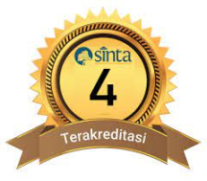VALIDITY OF STEM INTEGRATED STATIC FLUID E-MODULE TO IMPROVE STUDENT LEARNING OUTCOMES
Abstract
The rapid development of technology and information brings many impacts in various fields, especially in the field of education. Student learning activities with digital technology in learning cannot be separated, so students are expected to master technology such as electronic modules. Student learning outcomes seen from the final semester exams for class XI MIPA students are quite adequate with an average score of 5 classes, namely 62, so it is necessary to follow up with the manufacture of STEM integrated static fluid electronic modules to improve student learning outcomes. The purpose of this study was to determine the validity of the STEM integrated module with professional static fluid material flip pdf software. The research method used by Hannafin and Peck's instructional development model is focused on product-oriented learning design. The instrument used in the study was an electronic module validation sheet that involved 5 lecturers as product validators. Data analysis showed that the development of electronic teaching materials scored 85.63 which belonged to the category of good use. Therefore, the design of the STEM-integrated static fluid material electronic module can help online learning activities during the pandemic. Furthermore, this study is suggested to investigate the practicality and effectiveness of electronic modules.
Full Text:
PDFReferences
R. D. R. E. Prayogi, “Kecakapan Abad 21: Kompetensi Digital Pendidik Masa depan,” Manajemen Pendidikan, vol. 14, p. 144, 2019.
S. D. Laksana, “Pentingnya Pendidikan Karakter Dalam Menghadapi Education Technology The 21stCentury,” Jurnal Teknologi Pembelajaran , vol. 1, p. 1, 2021.
I. N. Fauziah, “Pengembangan Modul Pembelajaran Fisika Berbasis,” p. 3, 2019.
Kosasih, Pengembangan Bahan Ajar, Jakarta: Bumi Aksara, 2021.
C. A. Rahmatina, “Pengembangan Bahan Ajar Berbasis Science,,” Jurnal Phi, p. 28, 2019.
R. P. K. Wardhany, “Media Video Kejadian Fisika dalam Pembelajaran Fisika SMA,” JURNAL PEMBELAJARAN FISIKA, p. 2, 2014.
Y. Zahra Ade Wahyuni, “Praktikalitas E-Modul Kimia Unsur Berbasis Guided Discovery untuk Siswa Sekolah Menengah Atas,” EDUKATIF: JURNAL ILMU PENDIDIKAN, vol. 3, p. 681, 2021.
R. M. Y. D. D. Asrizal, “Perbandingan Hasil Belajar Menggunakan E-Modul berbasis CTL dengan Buku Teks Fisika Kelas X Pada Materi Hukum Newton Tentang Gerak dan Gravitasi di SMA N 12 Padang,” Pillar of Physics Education, p. 412, 2020.
D. D. P. K. Djoa, “Design and Feasibility of EXE Learning Media on the Topic of Chemical Bonding,” International Journal of Active Learning, p. 78, 2021.
L. C. dkk, “Exploring the Influence of Teachers’ Beliefs and 3D Printing Integrated STEM Instruction on Students’ STEM Motivation,” Elsevier, p. 7, 2020.
m. kanginan, Fisika Untuk SMA Kelas XI, Jakarta: Erlangga, 2017.
N. Kertiasa, FISIKA 1, Jakarta: Balai Pustaka, 1997.
N. I. d. D. K. Elfita Rahmi, “Pengembangan Modul Online Sistem Belajar Terbuka Dan Jarak Jauh Untuk Meningkatkan Kualitas Pembelajaran Pada Program Studi Teknologi Pendidikan,” Jurnal Visipena, vol. 1, p. 52, 2021.
S. J. B. Dazhi Yang, “Using Technology to Support Student Learning in an Integrated,” scholarworks, p. 2, 2020.
Sugiyono, Metode penelitian kuantitatif, kualitatif dan R&D, Bandung: Alfabeta, 2012.
R. Sundayana, Statistika Penelitian Pendidikan, Bandung: Alfabeta, 2016.
M. Z. a. T. P. P. Roza Linda, "Interactive E-Module of Integrated Science with Connected Type as Learning Supplement on Energy Topic," Journal of Physics: Conference Series, vol. 2049, no. 012022, p. 6, 2021.
S. a. H. Rifai, "Validity of physics edupark e-book with scientific approach based on tourism destinations of Rumah gadang," Journal of Physics: Conference Series, vol. 1876, no. 012057, p. 4, 2021.
DOI: http://dx.doi.org/10.24036/12195171074








